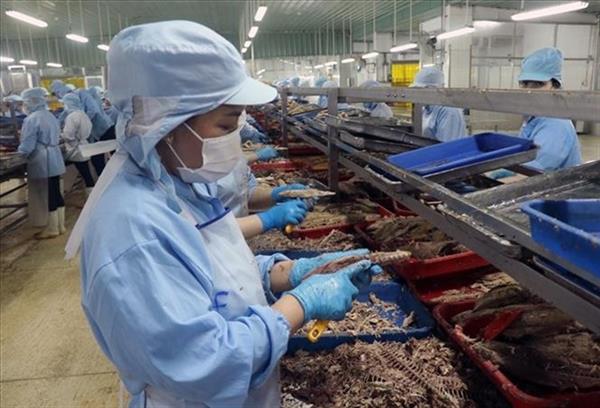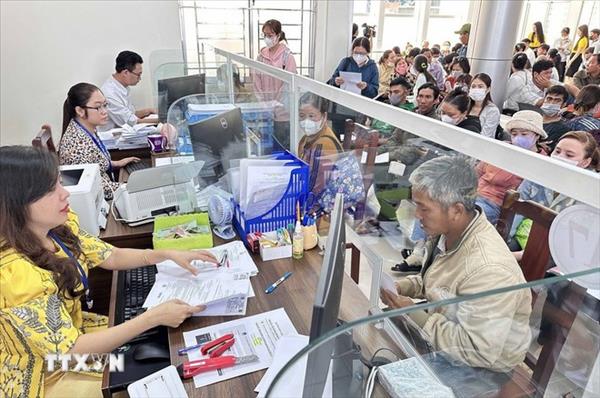Every morning, Kiem and his wife get up very early to limb hills after hills for collecting tea buds. Then they walk home with heavy baskets of tea buds hurting their shoulders. They had never thought of escaping poverty, not to mention earning quite a deal from the big old trees. However, a new project providing a new way of farming, processing and selling has changed their life.
“We had known nothing about expanding market and had no understanding on organic farming so the tea production and price were so low. Since receiving support from the local government and the International Fund for Agricultural Development, the tea quality has been improved with more diverse products. We have also been trained with farming techniques and doing business. During the past three years, tea price has been tripled”, Kiem told the Vietnam News Agency (VNA), citing his new pickup truck fully loaded with fresh tea buds. “I’ve got this car thanks to selling tea last year. Tea trees are precious to us.”
So far, Kiem has exported dozens of tonnes of organic tea products and sufficiently provided for his whole family. Tea production has made the once poor ethnic farmer a quite successful businessman with great vision for business development.
“I have advertised our tea products on social network platforms, including Facebook and Zalo. Foreign customers start buying a lot. I hope there will be more training courses on tea production and business practices so that our organic tea products could reach further”, said Kiem.
In a bid to improve the value of local tea products, Vi Xuyen district has exerted efforts in raising people awareness on farming techniques in line with organic and Vietnamese Good Agricultural Practice (VietGAP) standards, according to Dang Thi Phuong, Vice Chairwoman of Vi Xuyen district People’s Committee.
Endowed with favourable conditions for tea production, Ha Giang province in general and Cao Bo commune, Vi Xuyen district in particular has identified tea as one of major farm produce to help local ethnic minorities improve livelihood.
Tea – key to sustainable poverty reduction for ethnic minorities
Ha Giang province is the third largest tea-growing area in Vietnam, with 20,000 hectares of tea, of which 18,000 hectares are productive, with an annual output of 67,500 tonnes. Ha Giang province has identified tea among its key crops for agricultural development and poverty reduction.
Ha Giang possesses many old Shan Tuyet tea forests, mainly growing at altitudes of 600-1,000 metres above sea level in Vi Xuyen, Hoang Su Phi, Xin Man and Quang Binh districts.
With over 80 percent of population being ethnic minorities, Vi Xuyen district in Ha Giang province has been receiving special attention from local government in improving livelihood for residents within the district.
Dang Thi Phuong, Vice Chairwoman of Vi Xuyen district People’s Committee, said apart from the Party and State’s assistance, the district has also deployed a scheme on agricultural restructuring and planning.
Specifically, there are cooperatives and groups of households sharing the same product having been established in recent years in Vi Xuyen district. Through the cooperatives, local tea products are sold for a stable price, thus ensuring farmers’ income.
According to the district’s masterplan for local farm cultivation, for high-altitude communes such as Cao Bo, Thuong Son, Lao Chai, Sin Chai, tea and cao guo are identified as key farm produce for poverty reduction, Phuong added.
Apart from the local government’s assistance, the International Fund for Agricultural Development (IFAD) has been carrying out Community-based Poverty Reduction Programme (CPRP) on various agricultural products, including tea for the period of 2015-2020. The project concentrates its resources to support Ha Giang province in developing value chains for strong local products, including tea, orange, timber, cattle, honey, among others.
The project has provided local ethnic households with financial assistance to invest in production technology and expand business.
Two years ago, local Dao ethnic farmer Ly Thi Duyen and her family used to walk for miles to collect wood pecks for manual tea wilting. However, with financial assistance from CPRP, she now affords an automatic tea wilting machine. Since putting the machine into use, her workshop now could process up to one billion tonnes of fresh tea leaves, three times higher than the manual processing capacity.
Kiem’s workshop next door has recently been upgraded thanks to CPRP’s financial assistance of some 4,700 USD.
Besides financial assistance by CPRP, farmers have also received business training courses from communal and district governments. Through the training courses and self-learning from the internet, local ethnic community has had a better life thanks to selling tea in both domestic and foreign markets.
With high-quality tea products in hands, Hoang Tinh Kiem voiced his expectation that the government would provide due support and training for local ethnic farmers to expand markets.
Face-changing tea industry
In order to increase local tea trees’ economic value, Vi Xuyen district has conducted numerous measures to improve its tea quality and ensure market stability.
The population of 220 ancient Shan tea trees representing the tea area of Cao Bo commune, Vi Xuyen district, Ha Giang province has been recognized as Heritage of Vietnam. The recognition plays a major role in protecting gene pool of the renowned tea of the mountains.
In December 2018, the northern province of Ha Giang announced the geographical indication for Shan Tuyet tea, which covers tea produced in 44 communes of five districts and one city.
Ly Quoc, Chairman of People’s Committee of Cao Bo commune, said the geographical indication and organic cultivation method have significantly raised local tea value.
Therefore, local government has joined hands with village elders in encouraging local farmers to comply with organic cultivation method by including herbicide banning in local villages' rules, said Hung.
Besides, the locality has also held regular training sessions on organic farming methods for local households, Hung told VNA.
Still, farmers also voiced their hope that local government invests more on tea branding and origin traceability in order to make full use of tea’s economic advantages.
Efforts by local government has proven its determination of leaving no one behind. With ethnic minorities accounting for over 85% of Ha Giang province’s population, by focusing on key agricultural products which is of the province’s strength, the local government has improved livelihood of ethnic minorities living in the province.
Still, the locality needs to focus on many other criteria when it comes to poverty reduction, as the multi-dimensional poverty is now calculated on many services to which people are not entitled, according to Dang Thi Phuong, Vice Chairwoman of Vi Xuyen district People’s Committee.
VNA/VNP

















